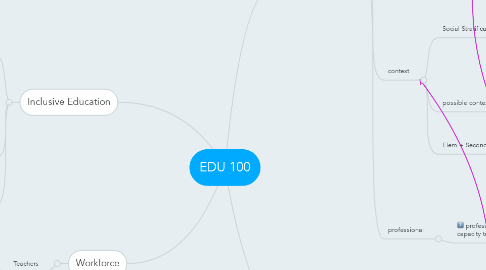
1. Inclusive Education
1.1. LGBT inclusive education (Michael Pair)
1.1.1. bullying/discrimination
1.1.2. vocabulary
1.1.2.1. queer
1.1.2.2. homophobia
1.1.2.3. transgendered
1.1.2.4. gay
1.1.2.4.1. lesbian
1.2. Aboriginal/Indigenous knowledge system significant in histories + contemporary developments in edu
1.2.1. residential schools
1.2.1.1. "aggressive assimilation"
1.2.1.2. legacy of physical, emotional, sexual abuse
1.2.1.2.1. Truth + Reconciliation Commission
1.2.1.2.2. government compensation package
1.2.2. two-spirit
1.3. hegemonic masculinity
1.3.1. gender differences in academic performance
2. Workforce
2.1. Teachers
2.1.1. 30% male
2.1.2. 70% female
2.1.3. Increase in demand
3. Teacher Identity
3.1. philosophy
3.1.1. Philosophy of Teaching Inventory
3.1.1.1. existentialism
3.1.1.1.1. discovery learning
3.1.1.2. perennialism
3.1.1.3. progressivism
3.1.1.4. behaviourism
3.1.1.5. essentialism
3.1.1.6. social reconstructionism
3.2. personal
3.2.1. experiences
3.2.1.1. Chalk movie
3.2.1.1.1. teacher subcultre
3.2.1.1.2. informal relationships w/ others in school
3.2.2. cultural + religious background
3.2.3. no such thing as a generic teacher or student
3.2.3.1. Hidden Curriculum
3.2.3.2. ex. racism, extremist ideologies
3.2.3.3. limited expression
3.2.3.3.1. Keegstra case
3.2.4. predispositions on teaching
3.2.5. Dr.Thomas:
3.3. context
3.3.1. Social Stratification (Kachur)
3.3.1.1. gender, race, class = social determinants
3.3.1.2. edu of parents + parental involvement
3.3.1.3. Resilience Framework
3.3.1.4. standardized testing
3.3.1.4.1. middle-class bias
3.3.2. possible contexts
3.3.2.1. conservative principal
3.3.2.2. low-income neighborhood
3.3.2.3. teaching at religious school
3.3.3. Elem + Secondary Edu (Leroy + Thomas)
3.3.3.1. toxic environments
3.4. professional
3.4.1. professional activity requires critical capacity to judge + act
3.4.1.1. ATA Professionalism (Yurick)
3.4.1.1.1. legal/legislated frameworks
3.4.1.2. performance vs. personal
4. Knowledge Systems
4.1. Historical
4.1.1. Purpose & Organization of schools
4.1.1.1. four pillars
4.1.1.1.1. Principle of dissent
4.1.1.1.2. Provincial responsibility
4.1.1.1.3. School boards
4.1.1.1.4. Minority language
4.1.1.2. chain of command
4.1.2. Sir Ken Robinson video
4.1.2.1. EDU system is outdated: based on context of industrial revolution
4.1.2.1.1. based on academic success
4.1.2.1.2. designed to weed out
4.1.2.2. structure of school systems should be based on abilities and skills, not age
